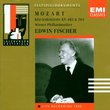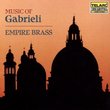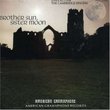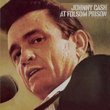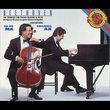| All Artists: Arthur Sullivan, Sir Charles Mackerras, Anthony Rolfe Johnson, Marie McLaughlin, Welsh National Opera Title: Gilbert & Sullivan - The Mikado / WNO · Mackerras Members Wishing: 0 Total Copies: 1 Label: Telarc Release Date: 2/11/1992 Genre: Classical Styles: Opera & Classical Vocal, Historical Periods, Classical (c.1770-1830) Number of Discs: 1 SwapaCD Credits: 1 UPC: 089408028427 |
Search - Arthur Sullivan, Sir Charles Mackerras, Anthony Rolfe Johnson :: Gilbert & Sullivan - The Mikado / WNO · Mackerras
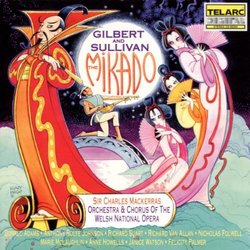 | Arthur Sullivan, Sir Charles Mackerras, Anthony Rolfe Johnson Gilbert & Sullivan - The Mikado / WNO · Mackerras Genre: Classical
Regarded by G & S fans as the best of the all the operettas, The Mikado is given a sizzling performance by Sir Charles Mackerras, who--by leaving off the overture (which isn't by Sullivan anyway)-- manages to squeeze... more » ![header=[] body=[This CD is available to be requested as disc only.]](/images/attributes/disc.png?v=430e6b0a) ![header=[] body=[This CD is unavailable to be requested with the disc and back insert at this time.]](/images/attributes/greyed_disc_back.png?v=430e6b0a) ![header=[] body=[This CD is available to be requested with the disc and front insert.]](/images/attributes/disc_front.png?v=430e6b0a) ![header=[] body=[This CD is unavailable to be requested with the disc, front and back inserts at this time.]](/images/attributes/greyed_disc_front_back.png?v=430e6b0a) |
Larger Image |
CD DetailsSynopsis
Amazon.com Regarded by G & S fans as the best of the all the operettas, The Mikado is given a sizzling performance by Sir Charles Mackerras, who--by leaving off the overture (which isn't by Sullivan anyway)-- manages to squeeze the piece onto one CD. He also shortens the "list" song since Gilbert's original features a prominent use of the "N" word, which, not withstanding the fact that he's making fun of people who performed in black-face in the 19th century, isn't worth the trouble it would cause by leaving it in. The singers are real singers; that is, they treat the music with respect and make it sound great. Of course, it is. --David Hurwitz Similar CDsSimilarly Requested CDs
|
CD ReviewsExcellent Musicianship, Excellent Value Mark Wylie | Spokane, WA United States | 02/24/2002 (5 out of 5 stars) "Conductor Sir Charles Mackerras has always been a champion of the music of Arthur Sullivan. In the early '90's, he began to record the Gilbert & Sullivan operettas with Telarc. Like the Sargent recordings of the '50's, Mackerras uses mostly opera singers--veterans of Covent Garden and of the English and Welsh National Operas--but he secured the services of two veteran Savoyards, Richard Suart and the late Donald Adams. Mackerras planned to record at least seven of the Savoy operas, perhaps more, but was forced to suspend the series--due to lack of funding as I understand. This fine recording of The Mikado, fortunately, was one of the four he was able to complete.Musically, this is a superb album. It is good to have Adams' famous portrayal of the Mikado in a splendid digital recording, and Suart, D'Oyly Carte's "patter" specialist at that time, is a superb Ko-Ko. Anthony Rolfe Johnson is a marvelous Nanki-Poo, and the veteran Richard Van Allan is a capable Pooh-Bah. The other singers are less well-known, but generally very good. Nicholas Folwell stands out as Pish-Tush, with a ringing "Our great Mikado" and a rock-firm contribution to the "cheap and chippy chopper" trio. Mackerras conducts superbly, with generally brisk tempi, but able to relax the pace when the situation calls for it--e.g, in the last part of the "little list" song, where his pacing allows Suart to emphasize the "apologetic statesmen" segment.None of the dialogue is included, and there are a few cuts to the score, most notably the second verse of the "little list." The less than memorable overture is also eliminated. The plus side of these cuts is that the entire operetta fits onto a single CD--an excellent value.If your primary interest is in a well sung and played "Mikado," this recording is a likely first choice. Even if you are in the "must have the dialogue" camp, or you simply can't do without Ko-Ko's reference to "that singular anomaly, the lady novelist," you'll probably find this an enjoyable supplement to other recordings." A digital Mikado set to eclipse all others Yi-Peng | Singapore | 01/31/2001 (5 out of 5 stars) "With this groundbreaking entry in the new Mackerras series, we are drawn into a new and fruitful era of Gilbert and Sullivan recordings. Mackerras devotes himself fully to the cause of Gilbert and Sullivan, and with a flick of his baton before the Welsh National Opera forces, he produces delicious results, even from his starry, inspired, first-rate singers. Donald Adams is on top form and in his element in his solid, satanic and memorably cheerfully-positive portrayal of the eponymous comical tyrannical autocrat. It is really amazing how he has managed to maintain his touch with the role since he recorded the role for D'Oyly Carte thirty years before contributing to this recording, because he still manages to maintain his inimitable style. As his son, Nanki-Poo, Anthony Rolfe Johnson uses his Lieder-singing experience to give a lyrical touch to the role and a romantic edge common in Marie McLaughlin's petite Yum-Yum. The rest of the major cast use their experience of English National Opera MIKADO days to shine themselves, with Richard Suart's Koko a defining highlight. Suart gives a delectably comical, dry-timbred and attractively humane portrayal of the Lord High Executioner, and the freshness in his voice manages to give John Reed a run for his money. (Remember that Suart was with D'Oyly Carte at the time, so he must have improved on his portrayal there.) Richard van Allan gives Pooh-bah a haughty edge, and Felicity Palmer's Katisha is commanding, comical and satirical. The minor cast is as supportive as the chorus, and Mackerras conducts with more delectable skill and wit than Godfrey, judging tempi perfectly except in the Little List song which is a little too slow. The overall effect is more vuluptuous than any other available recording, even D'Oyly Carte's, and with Telarc's first-rate digital recording nobody can ever go wrong with this Mikado (or rather the whole series.)This recording of MIKADO is not absolutely complete, but don't let this deter you from purchasing it. There are no instrumental movements - overture and fanfare - with the sung text absolutely complete, save for a cut of a few minor bars in the Act One finale and the second verse of Koko's little list song. That second verse uses the six-letter colour-related N-word that is as offensive to blacks as the four-letter sex-related F-word is to us. But I don't think it matters as in performance the Koko always uses a clever substitution of the word." The best bargain for the price F. Behrens | Keene, NH USA | 09/28/1999 (5 out of 5 stars) "First of all, this entire presentation fits onto a single CD, so you are paying 1/2 the price for starters. To make this happen, the producers have dropped the overture (which is one of the series' weakest and not even by Sullivan) and one stanza of Ko-Ko's "Little List" song. There are also a few bars missing from the Act I finale, but I cannot understand why. The voices are generally excellent, the conducting lively and completely in keeping with the joyous mood of this operetta (that is concerned with decapitation, boiling in oil, hanging, being buried alive, and other punishments that fit the crime). This is definitely of choice--unless you insist on absolute completeness."
|

 Track Listings (26) - Disc #1
Track Listings (26) - Disc #1